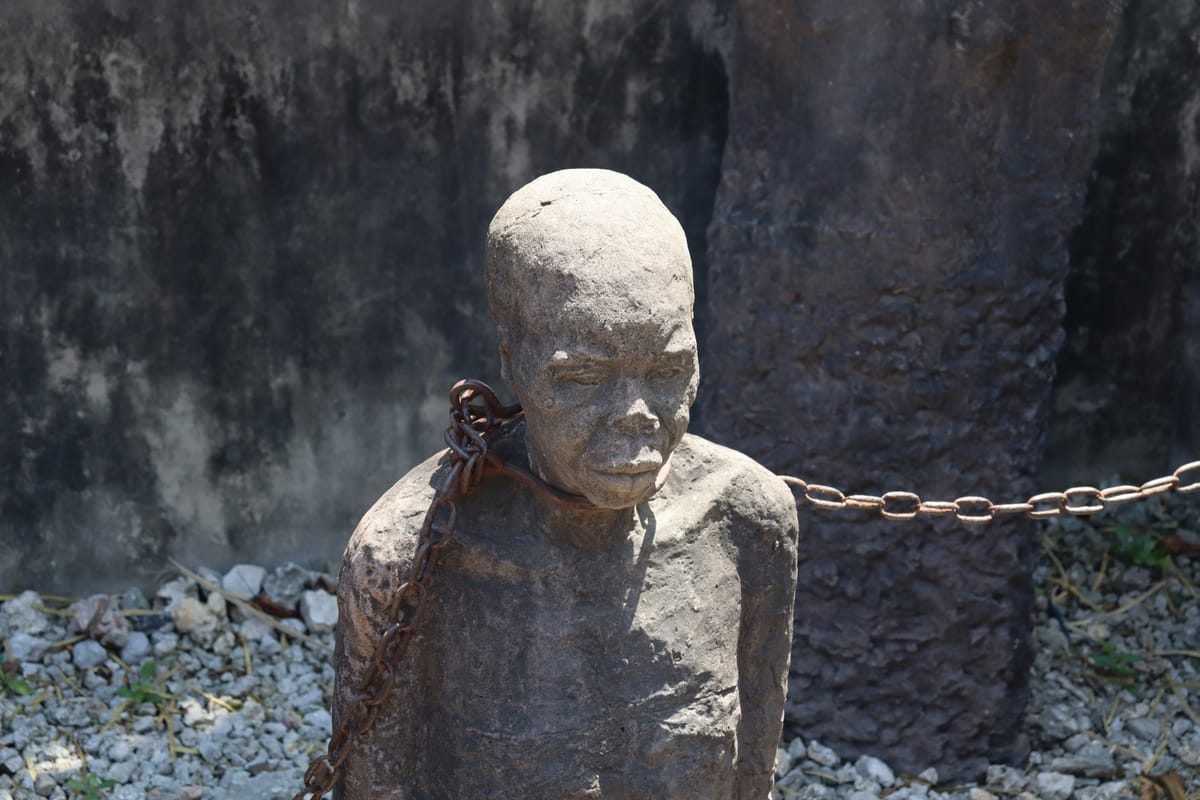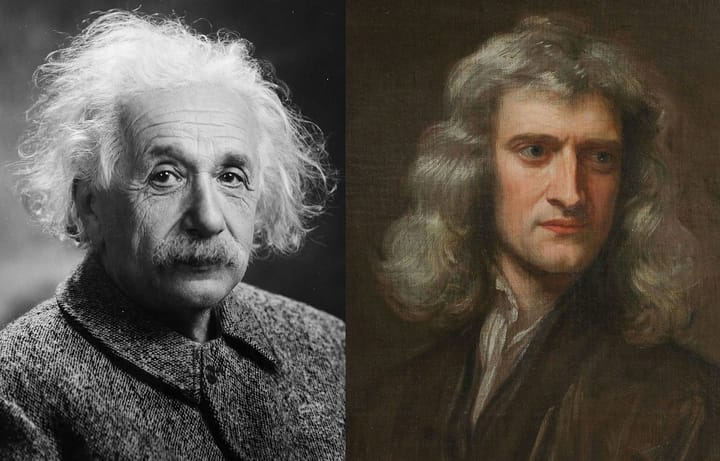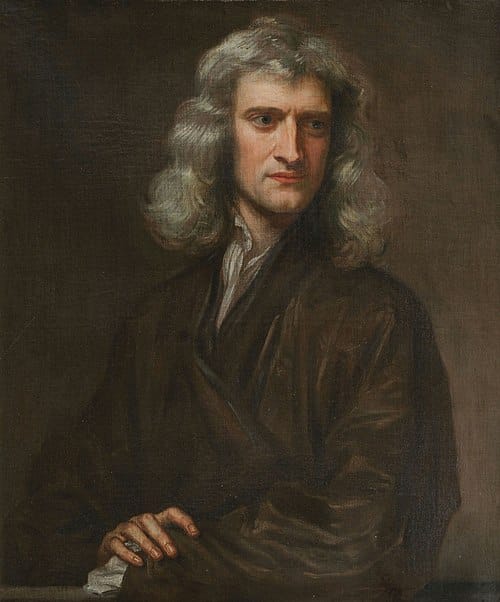Overcoming the Slave Mentality
You are not a slave, so why do you think like one?

What it means to be a slave does not rest on whether one wears shackles around their feet. What makes a free person free and a slave a slave—when all physical bondage is stripped away—comes down to a state of mind. It is not a mood or mere attitude but a mentality and philosophy, one that either adopts value or creates it. The implications of this concept may be uncomfortable; as no one wants to be told that their attitudes are reminiscent of a slave.
That their hearts may be chained without realizing it, if not by others, by ideas and social mores. But escape is not hopeless. And to first break the chains requires an understanding of how they work and why. Only then can one step into the mentality of the free and begin to create value for themselves.
The slave mentality, and why this is especially relevant to our times, has been explored through the eyes of the philosopher Wes Cecil (2018) through a lecture he once delivered at Peninsula College. Interpreting the famous words of the ancient Protagoras of Abdera (1921), "Man is the measure of all things, of the existence of the things that are and the non-existence of the things that are not" (as cited in Plato’s Theaetetus 152a, 1921). Cecil takes this not as the relativist golden standard but as the ultimate credo of a liberated individual.
In simpler terms, each person is the final arbiter of value. Not a god, not a king, and not an institution: you. The shape of both the liberated and the slave emerges: the former decides what is valuable and meaningful; the slave, on the other hand, is obedient and lets others decide for them.
Taken to its absolute extreme, Cecil's argument is as powerful as it is deceptively simple. As when viewing the individual in society, is it not true that since birth, a person is told exactly the do's, don'ts, what is valuable for them, and what isn't? Values and value systems are inherited; and rarely in the process is a person ever told that they ought to be the ones who decide what is valuable.
The very idea of the value of money, as a perfect example, is not one for an individual person to decide: it is told and commanded. The problems mount when one comes to realize that this is the same not only in the realm of economics but also in culture. A person is born and thrown out into the world (Heidegger uses the word Geworfenheit), and with that comes metaphysical baggage. The mentality of the free is simply that which decides what bags are worth taking, and which others are left behind. The slave is the one that, without question, takes all that they are handed.
Cecil outlines symptoms of the slave mentality in three distinct parts, and while it should be noted that these are by no means exhaustive, they are the telltale signs. And they are the "can'ts," the "don'ts," and the "musts". If a person constantly tells themselves that they cannot do something or that they must strictly obey the commands of what society says not to (obeying the don'ts), then they are a slave. Saying "I can't" is likely because of cowardice to try or dishonesty with oneself in order to save face.
In that fatal circumstance, one is a slave to their fears, and in the other, one is unwilling to say what they really mean for the sake of something other than themselves (34:26). The "musts" or the "I have to's" are pulled from the same strings: nothing is ever owed. "Value comes from you; therefore you do not have to do anything" (31:28). How strange is the idea that the free person is the one to decide what they will and what they choose not to pursue? If this sounds intentionally wrong, it is because society has already instilled in its subjects that it is.
This is part of the "don'ts". "Don't dress that way, don't speak that way, don't break the law, don't do that." We've all heard this in one form or another before, and for every "don't," there is an accompanying "do," but the composition is always the same: they are commands, and the individual is simply one who obeys. The free, however, manage to sever their shackles with the brilliant saber tempered from the fires within.
The human being first becomes a slave, and only a few manage to become free. Cecil recognizes this problem, and he understands that, for instance, children are in a power dynamic with adults and their overseers. That indeed, they are told the ins and outs, what they should and shouldn't do, as soon as they are able to understand. In one sense, it is reasonable, and children ought to be guided because they are immature humans that are liable to making mistakes out of ignorance—on the other side of the coin, this is society speaking.
It is indoctrination, and while perhaps there may be no way around it, at one point that child turned adult will come to realize they are their own person, and when the time arrives, they will necessarily have to consider what is worth pursuing not for the sake of their parents, their schoolteacher's, or even their friends, but for themselves. And when they realize they are in chains, what will they do? Follow the path of the slave and let others decide for them, or determine what is valuable for themselves? To say "I can't" is a decision in itself.
The free, contrary to the "I can'ts," ask themselves what is valuable, for they are its creator. "The world is as I will it" (26:48). To will is not a delusion or a rejection, but an affirmation. The free is he who affirms. And though it is a titanic task not to slip back into the crowd for the crowd's sake, the fruits of freedom are sweet.
And for every person, they taste quite different, as the free are never monolithic in character nor seek the same ends. One certainty, however, is that life is not culpable. How easy is it to point a finger and blame? It's always the fault of another, an idea, or an institution. In other words, life is always at fault.
This is the response of the slave who unwillingly positions themselves in relation to a cruel and cold master, whether that is God, fate, or fortune. The slave mentality finds fault elsewhere and everywhere but within. The free, however, understand that there are problems; they are not blind. But a constant hurling of excuses and the shifting of responsibility lead to not recognizing one's own misjudgments and errors. Thus the slave lies to themselves while blaming the world, while the free never hold it accountable because it is theirs to will.
There is no better time to expand Wes Cecil's philosophy and to dispel some of the mistakes regarding the potential character of the free and where potential criticisms from above and from below might rear their heads. An easy moral objection is to say that the mentality of the free can lead to chaos, violence, and destruction.
That if the individual were in complete control of their actions and thoughts, it would pose a danger to others. Cecil himself says that we are not "craven, hopeless animals" (37:38) when left to our own devices. Humanity does not need endless rules upon rules like heavyweights in order to function—that legalism is the thinking of the slave that begs to be ruled. Society is no Hobbesian nightmare and one less rule away from the war of all against all.
Nor is it clear that this poverty-stricken interpretation of humanity is entirely accurate. Are social rules and legality the only safeguards against wanton behavior? Faith in humanity means nothing when it is assumed human nature, if there is such a thing, belongs to nothing but depravity and brutality. In argumento, supposing that portrait of humanity is accurate, the liberated are still not necessarily opposed to rules themselves; rather, they are against rules that do not align with them, nor do they delimit human behavior.
Kindness, for instance, is not excluded under the mentality of the free. For that matter, and as seen by Wes Cecil, it is often that of the slave that wishes to keep others down.
How else could one witness an ascension and have nothing other than envy and hatred in their heart? They see in the free not inspiration, but luck. The slave, looking in the mirror, sees a victim of fate. They gaze upon other slaves in bondage and wish for them to stay right where they are. The picture of the slave is now in full view. A slave knows nothing but their slavery and the relation to the master, so the result is that they dream to become the master and shackle someone else, to have slaves of their own and keep others down. The slave thus stays within the dialectic of the master and the slave. The free have no master aside from being masters of themselves; they do not need slaves to reinforce their values, as they reinforce and create their own.
The free are always seeking greater heights, and when they ascend, they inspire. The historical backing is as clear as day: Goethe, the same man who wrote Faust as well as Goetz, the one who helped shape German language and German literature, also wrote The Metamorphosis of Plants because he did not care about what his readers wanted or thought.
It was Goethe's sparkling character, along with his genius and acute awareness of his value, that enabled him to become Germany's perhaps most influential figure in the humanities and arts.
And while Goethe may be in a league of his own, when confronted with the wall that is the tyranny of grammar, James Joyce had to first shatter tradition and bend language to his will to get to the other side. He managed to do so, not unscathed or without facing censorship, and the result was the masterpiece Ulysses, a timeless story that went against the grain. Both Goethe's and Joyce's wills and values recognized themselves as worthy, and out of that sprung creation.
That is not to say they were perfect, but that they never failed to rise and hold true to themselves when it mattered. They committed to their visions, and while Cecil neglects to mention either, he manages to recognize the practice of their weak-willed counterparts: the trick of the slave is to not commit.
A slave is always "stuck" within inaction and victimhood. The free know what they value and vow to make it happen. The slave, in contrast, produces excuses for why they can't (46:10). And while the slavish mentality can at times creep and get ahold of the best of us, an individual, however, is never completely doomed to the fate of a slave, and one of the many virtues of people like Goethe and Joyce is that they set the example of overcoming the numerous "I can't" of the world in favor of “I will.” It is also what makes them terribly foreign and frightening to some—the sunlight always burns those who are used to living in darkness.
Wes Cecil's lecture, as part of a series of lectures detailing the ever-complex and changing world, is aptly entitled You Are Not A Slave. It is a vibrant lecture that prefers elevation and joy to suffering (despite seeing suffering's educational value), all while ensuring the message keeps a sound, philosophical edge. And while his interpretation of Protagoras is unique, the philosophy he expounds can be expanded to have fascinating implications and possible points of contention. For instance, the misguided notion of a totalizing conformity disappears.
A slave can criticize another slave just as a free person can another. So can a slave to the free, and vice versa. Hence, the free are not monolithic, and neither are the slaves (but the resemblances of the slaves are stronger and in greater number). This also means there is room for disagreement, and Cecil's own inclinations towards inspiration and uplifting others can be disputed, not only from the viewpoint of the slave as mentioned earlier, but from another freed.
It must then be called into question whether the attitude Cecil has in his mind regarding the free can be generalized to the point it has: it may be the dream of the slave to shackle others as a master, but what is stopping a free person from doing just that? What is to prevent them from slipping back into the dialectic not as a slave, but as a master whose values determine the role as worthy?
A more damning question is, does becoming a master and dominating others necessarily belong exclusively to the dream of a slave? If so, then the free man is always at risk of being chained once again. Part of the trouble that arises is that this description of the free does contain Cecil's own prescription of what one ought to be (inspirational and uplifting). Cecil can be defended in that he never claims objectivity, but by the free person's praxis, anything can be defended, praised, disregarded, or made valueless, and this does not exclude the common, 'attractive' virtues—the virtues of the slave.
The system does not collapse, nor do these questions contradict the theory, but they do expose Cecil's own inclination to the warm feelings of inspiration and uplifting experiences that he gently places in the hands of the free. Regardless, it is the individual who decides whether to discard or care for what is given to them. After all, they do not need outside reinforcement of their values (59:30), and that includes the suggestions of the formulator of this interpretation and philosophy itself.
If the goal is to get beyond both the master and the slave (9:20), then it cannot be ruled out that the free can find themselves back in the vicious circle. Staying outside the circle is one matter, and getting out of it is quite another. And the very conditions for the latter are still as of yet missing.
This leads to the last virtue of the free, and realistically, it is required before undertaking the journey: courage. Courage does not mean not having fear, but it does mean having the willingness to venture into the depths despite it. Scarcely mentioned in the lecture, the courage required to be a creator and hold the reins of one's own life is tremendous—but what is the cost of freedom?
What is the cost of affirming one's happiness and bettering oneself? From a certain angle; the cost is reduced to nothing because one has everything. Remember, "The world is as I will it" (26.49). And how that point is first reached is through discovery and the willingness to try; to create as opposed to merely adopt. And the first step to creation is to take the time to look over what calls our hearts and find out if it is actually ours. The natural result of this philosophy is simple and empowering: "If any human being has ever been able to do something, there's a chance you can do it" (34:17).
What, then, is the philosophy of the free? Is it a philosophy of pride, or is it a realization of self-worth? If pride is a sin, then that should go to show by whose standards they belong.
I suggest another perspective: it is a philosophy of affirming, willing, and creation—a philosophy of deciding in the world what is worth taking, and if it does not exist, it births it into existence. And to do this and reach another side of paradise requires first the overcoming of the slave mentality—the death of the slave. Wes Cecil does not see the physical shackles of slavery, but he sees slaves everywhere.
To break out of mental slavery and to become free, remember that you are the measure of all things. Anything less is not who you could be, and a life dictated by others is none.
References
Cecil, W. (2018, November 18). You are not a slave [Video]. Youtube. https://youtu.be/KeKEVRKEoms?si=O4eN7ky722aS9Nk7
Plato. (1921). Plato in twelve volumes, Vol. 12 ( Harold N. Fowler trans.). (Theaetetus 152a). Harvard University Press. http://data.perseus.org/citations/urn:cts:greekLit:tlg0059.tlg006.perseus-eng1:152a



Comments ()